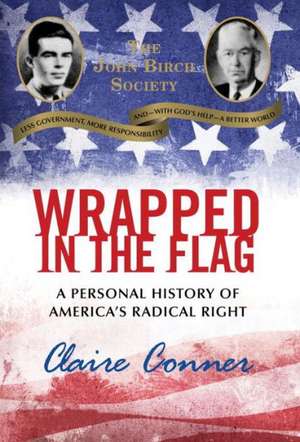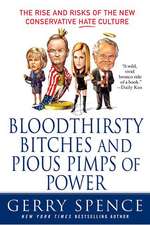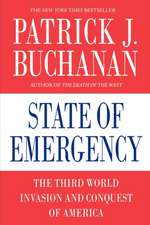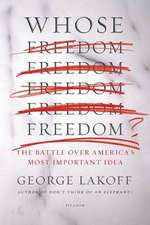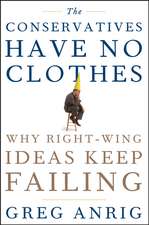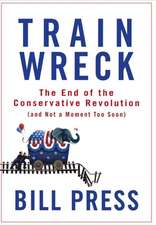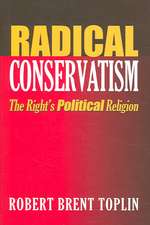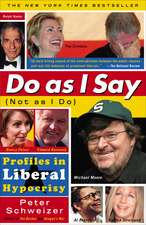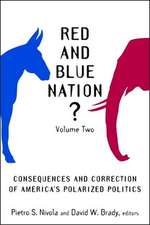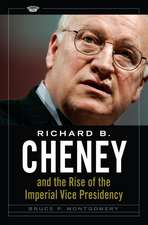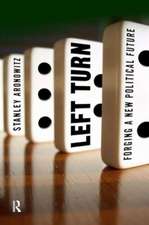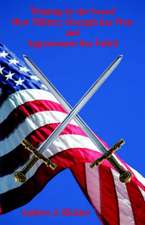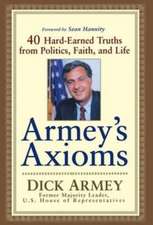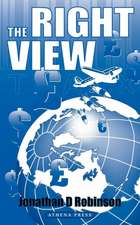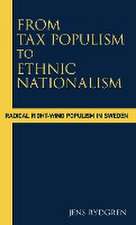Wrapped in the Flag: What I Learned Growing Up in America's Radical Right, How I Escaped, and Why My Story Matters Today
Autor Claire Connoren Limba Engleză Paperback – 17 mar 2014
Long before the rise of the Tea Party movement and the prominence of today’s religious Right, the John Birch Society, first established in 1958, championed many of the same radical causes touted by ultraconservatives today, including campaigns against abortion rights, gay rights, gun control, labor unions, environmental protections, immigrant rights, social and welfare programs, the United Nations, and even water fluoridation.
Worshipping its anti-Communist hero Joe McCarthy, the Birch Society is perhaps most notorious for its red-baiting and for accusing top politicians, including President Dwight Eisenhower, of being Communist sympathizers. It also labeled John F. Kennedy a traitor and actively worked to unseat him. The Birch Society boasted a number of notable members, including Fred Koch, father of Charles and David Koch, who are using their father’s billions to bankroll fundamentalist and right-wing movements today.
The daughter of one of the society’s first members and a national spokesman about the society, Claire Conner grew up surrounded by dedicated Birchers and was expected to abide by and espouse Birch ideals. When her parents forced her to join the society at age thirteen, she became its youngest member of the society. From an even younger age though, Conner was pressed into service for the cause her father and mother gave their lives to: the nurturing and growth of the JBS. She was expected to bring home her textbooks for close examination (her mother found traces of Communist influence even in the Catholic school curriculum), to write letters against “socialized medicine” after school, to attend her father’s fiery speeches against the United Nations, or babysit her siblings while her parents held meetings in the living room to recruit members to fight the war on Christmas or (potentially poisonous) water fluoridation. Conner was “on deck” to lend a hand when JBS notables visited, including founder Robert Welch, notorious Holocaust denier Revilo Oliver, and white supremacist Thomas Stockheimer. Even when she was old enough to quit in disgust over the actions of those men, Conner found herself sucked into campaigns against abortion rights and for ultraconservative presidential candidates like John Schmitz. It took momentous changes in her own life for Conner to finally free herself of the legacy of the John Birch Society in which she was raised.
In Wrapped in the Flag, Claire Conner offers an intimate account of the society —based on JBS records and documents, on her parents’ files and personal writing, on historical archives and contemporary accounts, and on firsthand knowledge—giving us an inside look at one of the most radical right-wing movements in US history and its lasting effects on our political discourse today.
Preț: 134.81 lei
Nou
Puncte Express: 202
Preț estimativ în valută:
25.80€ • 26.61$ • 21.53£
25.80€ • 26.61$ • 21.53£
Carte tipărită la comandă
Livrare economică 27 martie-10 aprilie
Preluare comenzi: 021 569.72.76
Specificații
ISBN-13: 9780807033319
ISBN-10: 0807033316
Pagini: 249
Dimensiuni: 154 x 227 x 19 mm
Greutate: 0.4 kg
Editura: Beacon Press (MA)
ISBN-10: 0807033316
Pagini: 249
Dimensiuni: 154 x 227 x 19 mm
Greutate: 0.4 kg
Editura: Beacon Press (MA)
Notă biografică
Claire Conner’s father was a national spokesperson for the John Birch Society for more than thirty years; her mother was also a staunch follower. Conner holds a degree in English with honors from the University of Dallas and a graduate degree from the University of Wisconsin. She lives in Tampa, Florida.
Extras
Preface
I Know What Exremism Looks Like
Five years ago, I was sure I’d heard the last of conspiracies, secret Communists, and America’s imminent collapse. After all, the Cold War had been over for twenty years, my parents and most of their fanatic friends were dead, and the Bush administration was killing America’s appetite for right-wing Republicans.
“There’s no one left to hoist the extremist flag,” I told myself. I was wrong. By 2008, political discourse sounded eerily similar to that of 1958, when a brand-new right-wing, populist movement—the John Birch Society—burst onto the American scene. All across the country, newly awakened Birchers rallied to “take our county back.” Two dedicated Birch leaders mobilized the Midwest: Stillwell and Laurene Conner—my parents.
Dad and Mother had been primed for their lurch to the right for many years. They loved Joseph McCarthy and hated the Communists. They’d decided that government assistance made people weak and lazy, and that the New Deal was really a bad deal. They loathed Franklin Roosevelt and blamed Democrats for destroying our free-enterprise system. So in 1955, when Mother and Dad were introduced to Robert Welch, a candy-company executive turned conspiracy hunter, they immediately recognized a kindred soul. My father said Welch was “a brilliant mind and the finest patriot I’ve ever had the privilege to know.” Three years later, when Welch founded his John Birch Society, Mother and Dad didn’t hesitate— they signed up and immediately handed over $2,000 for lifetime memberships, the equivalent of about $15,000 today.
The John Birch Society became my parents’ lifelong obsession; nothing was allowed to interfere with the next meeting, the next project, the next mailing. At fourteen and thirteen, respectively, my older brother and I were deemed old enough to take up the cause as full-fledged adult members. During Birch activities, the other Conner children were banished upstairs, where my ten-year-old sister was put in charge of the baby (eighteen months) and my six-year-old brother fended for himself. In only a few months, the entire Conner family lived and breathed Birch.
Night after night, Birch activists and new recruits filled our living room.
They received hours of instruction about the secret conspiracy, the New World Order, hidden codes on the dollar bill, and Communist spies inside our government. Birchers were schooled in the evils of creeping socialism, Communism, and Marxism. Good Birchers understood the sins of welfare and Social Security. It was time to rise up against the unholy alliance of the Left—Communists, socialists, liberals, union bosses, and the liberal press. Robert Welch identified Communists as one enemy in this epic struggle to save the country. Of course, in the 1950s the march of the Communists across Eastern Europe and Asia was scary to Americans, but Welch was more worried about the Communists lurking inside our country, often holding positions of influence. These home-grown American Communists were ready to spring into action to take down our Constitution and replace it with a socialist manifesto.
Birchers believed that those American Communists were all over the place. They served on school boards, advocated putting fluoride in drinking water, and taught subversive university classes. Others organized labor unions, led the civil rights movement and served in the Congress. The Birch message resonated. Membership exploded and revenue spiked. My father was rewarded for his dedication with a promotion to the Birch National Council, where he served for thirty-two years.
-
From the outset, the GOP applauded the Birchers for their patriotic zeal and embraced them as good Republicans. But after a scandal rocked the society in 1961, the GOP worried that its closeness to the Birchers would taint the Republican brand. It could not afford to be painted by the Democrats as the political arm of the radical right. Republican leaders decided to label the Birchers as crackpots and push them out of the party. Problem solved. The effort worked. Before long, the Birchers had joined the Ku Klux Klan, Aryan Nations, and other kooks as the most extreme reactionaries in American politics. The Republican Party took credit for saving the United States from fringe-of-the-fringe crusaders who imagined that even the president was a Commie. In the late 1960s and early 1970s, while the politicians and pundits declared the Birchers dead and buried, the moneyed Birch leadership went to plan B, redirecting their cash and their influence into think tanks and foundations. My parents joined in that diversifying effort. They founded a right-wing Catholic organization, the Wanderer Foundation, in St. Paul, Minnesota and donated to every right-wing organization and political-action committee they could. My parents never had big money, but other Birch families spent huge sums to bankroll Birch ideas. Fred Koch, one of the original Birch founding members and a National Council member with my father, invested a small fortune on his pet projects, including the so-called right-to-work laws, designed to hamper union organizing. His sons, David and Charles Koch, inherited their father’s multimillions, turned them into multibillions, and invested liberally in their favorite political causes: the Cato Institute, the Heritage Foundation, Americans for Prosperity, and others. Those organizations incorporated many John Birch Society ideas and effectively increased both their reach and their impact on American politics. Since Citizens United, the 2011 Supreme Court decision that opened the floodgates to unlimited and unregulated corporate political donations, the Kochs have contributed hundreds of millions of dollars to individual candidates and political-action committees. The Kochs and their allies envision the same framework for American government that I heard from my father and his John Birch Society allies: the New Deal dismantled, the federal government reduced to a quarter of its current size, and most federal programs gutted. In this right-wing, libertarian utopia, businesses and individuals would be free to do anything, unrestrained by rules or taxes. In 2008, when the economy tanked and Barack Obama emerged as the Democratic nominee for president, the radical right went on the offense. The Democrat was labeled a Marxist, a Socialist, and a friend of terrorists. Folks unfurled the yellow “Don’t Tread on Me” flag and shouted about trees of liberty being watered with the blood of tyrants. When I heard frenzied voters at a Republican rally shouting, “Treason,” and “Kill him,” in response to one of Sarah Palin’s anti-Obama rants, I worried. “My parents are back,” I told anyone who’d listen. People looked at me like I’d lost my mind. I realized that the Birch Society had faded out of America’s memory. It had been confined to a footnote on
a footnote for political wonks. Six months after President Obama was inaugurated, a new right-wing, populist movement arose. The Tea Party—bankrolled by the Koch brothers and Americans for Prosperity—staged rallies and protests across the country. Self-appointed zealots suggested “Second Amendment remedies” if they didn’t achieve their goals at the ballot box. I shuddered when I heard my father’s favorite rally cry: “We’ve come to take our country back.”
These newly minted right-wingers were rattling off old Birch slogans:
• Immigrants are the enemy. Protect our borders and deport all illegal aliens.
• Gays are ungodly. Pray the gay away from children and teens.
• Unemployed people don’t want to work, and poor people keep themselves poor, on purpose. If we cut the minimum wage and eliminate unemployment compensation, everyone will have a job.
• Unions caused the economic collapse by shielding lazy, incompetent public employees.
• Rich folks are “job creators,” and we need to protect their wealth.
• Social Security is unsustainable, and Medicare and Medicaid have to be restricted so that corporations and “job creators” have lower tax rates.
• Abortion is murder and must be outlawed even in cases of rape and incest. No exception means no exceptions; even in cases where the mother’s life is in danger.
• The economic meltdown of 2008 came from high taxes on corporations, too many regulations, and poor people taking out mortgages they couldn’t afford.
• The government can’t create jobs, so stimulus programs don’t work. Cutting taxes creates jobs.
• The government can’t limit the right to own or carry guns. If guns are outlawed, only outlaws will have guns.
• America is God’s chosen nation, but our president can’t understand our exceptionalism. After all, he’s not a “real” American; he’s a Marxist, Socialist, Muslim racist who hates America.
I know that this new radical Right is a rewrite of the old John Birch Society. This time, however, the movement has enormous political muscle, unlimited dollars, and right-wing media support. This reality hit me after studying my parents’ files and personal writing, combing historical archives, and reading contemporary accounts and documents produced by the Birch Society itself.
My notes credit published works and archival documents, but much of this narrative comes from my experience. This book chronicles the history of the John Birch Society and its impact on America, past and present. But above all, Wrapped in the Flag is my story.
I Know What Exremism Looks Like
Five years ago, I was sure I’d heard the last of conspiracies, secret Communists, and America’s imminent collapse. After all, the Cold War had been over for twenty years, my parents and most of their fanatic friends were dead, and the Bush administration was killing America’s appetite for right-wing Republicans.
“There’s no one left to hoist the extremist flag,” I told myself. I was wrong. By 2008, political discourse sounded eerily similar to that of 1958, when a brand-new right-wing, populist movement—the John Birch Society—burst onto the American scene. All across the country, newly awakened Birchers rallied to “take our county back.” Two dedicated Birch leaders mobilized the Midwest: Stillwell and Laurene Conner—my parents.
Dad and Mother had been primed for their lurch to the right for many years. They loved Joseph McCarthy and hated the Communists. They’d decided that government assistance made people weak and lazy, and that the New Deal was really a bad deal. They loathed Franklin Roosevelt and blamed Democrats for destroying our free-enterprise system. So in 1955, when Mother and Dad were introduced to Robert Welch, a candy-company executive turned conspiracy hunter, they immediately recognized a kindred soul. My father said Welch was “a brilliant mind and the finest patriot I’ve ever had the privilege to know.” Three years later, when Welch founded his John Birch Society, Mother and Dad didn’t hesitate— they signed up and immediately handed over $2,000 for lifetime memberships, the equivalent of about $15,000 today.
The John Birch Society became my parents’ lifelong obsession; nothing was allowed to interfere with the next meeting, the next project, the next mailing. At fourteen and thirteen, respectively, my older brother and I were deemed old enough to take up the cause as full-fledged adult members. During Birch activities, the other Conner children were banished upstairs, where my ten-year-old sister was put in charge of the baby (eighteen months) and my six-year-old brother fended for himself. In only a few months, the entire Conner family lived and breathed Birch.
Night after night, Birch activists and new recruits filled our living room.
They received hours of instruction about the secret conspiracy, the New World Order, hidden codes on the dollar bill, and Communist spies inside our government. Birchers were schooled in the evils of creeping socialism, Communism, and Marxism. Good Birchers understood the sins of welfare and Social Security. It was time to rise up against the unholy alliance of the Left—Communists, socialists, liberals, union bosses, and the liberal press. Robert Welch identified Communists as one enemy in this epic struggle to save the country. Of course, in the 1950s the march of the Communists across Eastern Europe and Asia was scary to Americans, but Welch was more worried about the Communists lurking inside our country, often holding positions of influence. These home-grown American Communists were ready to spring into action to take down our Constitution and replace it with a socialist manifesto.
Birchers believed that those American Communists were all over the place. They served on school boards, advocated putting fluoride in drinking water, and taught subversive university classes. Others organized labor unions, led the civil rights movement and served in the Congress. The Birch message resonated. Membership exploded and revenue spiked. My father was rewarded for his dedication with a promotion to the Birch National Council, where he served for thirty-two years.
-
From the outset, the GOP applauded the Birchers for their patriotic zeal and embraced them as good Republicans. But after a scandal rocked the society in 1961, the GOP worried that its closeness to the Birchers would taint the Republican brand. It could not afford to be painted by the Democrats as the political arm of the radical right. Republican leaders decided to label the Birchers as crackpots and push them out of the party. Problem solved. The effort worked. Before long, the Birchers had joined the Ku Klux Klan, Aryan Nations, and other kooks as the most extreme reactionaries in American politics. The Republican Party took credit for saving the United States from fringe-of-the-fringe crusaders who imagined that even the president was a Commie. In the late 1960s and early 1970s, while the politicians and pundits declared the Birchers dead and buried, the moneyed Birch leadership went to plan B, redirecting their cash and their influence into think tanks and foundations. My parents joined in that diversifying effort. They founded a right-wing Catholic organization, the Wanderer Foundation, in St. Paul, Minnesota and donated to every right-wing organization and political-action committee they could. My parents never had big money, but other Birch families spent huge sums to bankroll Birch ideas. Fred Koch, one of the original Birch founding members and a National Council member with my father, invested a small fortune on his pet projects, including the so-called right-to-work laws, designed to hamper union organizing. His sons, David and Charles Koch, inherited their father’s multimillions, turned them into multibillions, and invested liberally in their favorite political causes: the Cato Institute, the Heritage Foundation, Americans for Prosperity, and others. Those organizations incorporated many John Birch Society ideas and effectively increased both their reach and their impact on American politics. Since Citizens United, the 2011 Supreme Court decision that opened the floodgates to unlimited and unregulated corporate political donations, the Kochs have contributed hundreds of millions of dollars to individual candidates and political-action committees. The Kochs and their allies envision the same framework for American government that I heard from my father and his John Birch Society allies: the New Deal dismantled, the federal government reduced to a quarter of its current size, and most federal programs gutted. In this right-wing, libertarian utopia, businesses and individuals would be free to do anything, unrestrained by rules or taxes. In 2008, when the economy tanked and Barack Obama emerged as the Democratic nominee for president, the radical right went on the offense. The Democrat was labeled a Marxist, a Socialist, and a friend of terrorists. Folks unfurled the yellow “Don’t Tread on Me” flag and shouted about trees of liberty being watered with the blood of tyrants. When I heard frenzied voters at a Republican rally shouting, “Treason,” and “Kill him,” in response to one of Sarah Palin’s anti-Obama rants, I worried. “My parents are back,” I told anyone who’d listen. People looked at me like I’d lost my mind. I realized that the Birch Society had faded out of America’s memory. It had been confined to a footnote on
a footnote for political wonks. Six months after President Obama was inaugurated, a new right-wing, populist movement arose. The Tea Party—bankrolled by the Koch brothers and Americans for Prosperity—staged rallies and protests across the country. Self-appointed zealots suggested “Second Amendment remedies” if they didn’t achieve their goals at the ballot box. I shuddered when I heard my father’s favorite rally cry: “We’ve come to take our country back.”
These newly minted right-wingers were rattling off old Birch slogans:
• Immigrants are the enemy. Protect our borders and deport all illegal aliens.
• Gays are ungodly. Pray the gay away from children and teens.
• Unemployed people don’t want to work, and poor people keep themselves poor, on purpose. If we cut the minimum wage and eliminate unemployment compensation, everyone will have a job.
• Unions caused the economic collapse by shielding lazy, incompetent public employees.
• Rich folks are “job creators,” and we need to protect their wealth.
• Social Security is unsustainable, and Medicare and Medicaid have to be restricted so that corporations and “job creators” have lower tax rates.
• Abortion is murder and must be outlawed even in cases of rape and incest. No exception means no exceptions; even in cases where the mother’s life is in danger.
• The economic meltdown of 2008 came from high taxes on corporations, too many regulations, and poor people taking out mortgages they couldn’t afford.
• The government can’t create jobs, so stimulus programs don’t work. Cutting taxes creates jobs.
• The government can’t limit the right to own or carry guns. If guns are outlawed, only outlaws will have guns.
• America is God’s chosen nation, but our president can’t understand our exceptionalism. After all, he’s not a “real” American; he’s a Marxist, Socialist, Muslim racist who hates America.
I know that this new radical Right is a rewrite of the old John Birch Society. This time, however, the movement has enormous political muscle, unlimited dollars, and right-wing media support. This reality hit me after studying my parents’ files and personal writing, combing historical archives, and reading contemporary accounts and documents produced by the Birch Society itself.
My notes credit published works and archival documents, but much of this narrative comes from my experience. This book chronicles the history of the John Birch Society and its impact on America, past and present. But above all, Wrapped in the Flag is my story.
Recenzii
“Both of Claire Conner’s parents were deeply involved in the cult of far right politics: they knew that Eisenhower was a secret Communist and they idolized Francisco Franco. Wrapped in the Flag is at once the heartbreaking and intermittently hilarious story of her coming of age and a first-hand history of the far right since the 1950s. Conner’s book is required reading for anyone who wants to understand the sources of the conspiratorial, hate-filled tropes of the right today—whether they emanate from the Tea Party, the gun movement, race realists, Sovereign Citizens, or, increasingly, from elected officials in the GOP." —Arthur Goldwag, author of The New Hate: Fear and Loathing on the Populist Right
“An invaluable contribution to understanding the mentality of extremist conservatism and its supporters.” —Kirkus, starred review
“The John Birch Society had a huge impact on American politics. They were responsible for the lurch into insanity. The religious right, the Tea Party and the takeover of the Republican Party by extremists can't be understood unless you understand the paranoid xenophobia Birchers injected into America. This book is about a journey through and out of that Bircher netherworld. It's a vital piece of the puzzle to understanding the madness that overcame America and a moving story about one person's journey back to sanity.” —Frank Schaeffer, author of Crazy For God
"Experiencing this splendid volume is like reading a history book inside out: events you only knew about from afar are revealed anew, with the striking ground-level intimacy of a fine family memoir. I've been waiting for a book like this: one that demonstrates the shockingly effectual continuity of the John Birch Society as a force in American political life: from its early days discrediting the Cold War credentials of JFK, to its outsized role building up grassroots momentum in the Clinton impeachment, to its sudden eruption into mainstream Republican thinking with the rise of the Tea Party movement." —Rick Perlstein, author of Nixonland
“This passionate, personal history of the John Birch Society is timely and important. At a moment when Tea Party activists have embraced many of the Birchers' most outrageous notions, Claire Conner has performed a great service by reminding us of the origins of some of most virulent ideas that continue to pollute our body politic. As the skeptical daughter of two passionate Birchers, Conner may be the only person who could have written such a clear-eyed, insider’s account of the persistent dangers of right-wing extremism.” —Charles Kaiser, author of 1968 In America and The Gay Metropolis
“An affecting portrait of late-20th-century America on the fringe." —Publishers Weekly
“This insider’s view of the most radical right-wing organization of the Cold War era describes the seeming paranoia and questionable logic of the most devoted JBS members. Conner provides colorful descriptions of many of the eccentric JBS leaders, including founder Robert Welch. . . . Readers interested in learning more about this example of the Cold War era’s ultraconservative political trends will be fascinated by Conner’s description of the perpetual fear of JBS members regarding communist takeovers and communist infiltration of the highest levels of our government. Recommended.” —Library Jounal
“An invaluable contribution to understanding the mentality of extremist conservatism and its supporters.” —Kirkus, starred review
“The John Birch Society had a huge impact on American politics. They were responsible for the lurch into insanity. The religious right, the Tea Party and the takeover of the Republican Party by extremists can't be understood unless you understand the paranoid xenophobia Birchers injected into America. This book is about a journey through and out of that Bircher netherworld. It's a vital piece of the puzzle to understanding the madness that overcame America and a moving story about one person's journey back to sanity.” —Frank Schaeffer, author of Crazy For God
"Experiencing this splendid volume is like reading a history book inside out: events you only knew about from afar are revealed anew, with the striking ground-level intimacy of a fine family memoir. I've been waiting for a book like this: one that demonstrates the shockingly effectual continuity of the John Birch Society as a force in American political life: from its early days discrediting the Cold War credentials of JFK, to its outsized role building up grassroots momentum in the Clinton impeachment, to its sudden eruption into mainstream Republican thinking with the rise of the Tea Party movement." —Rick Perlstein, author of Nixonland
“This passionate, personal history of the John Birch Society is timely and important. At a moment when Tea Party activists have embraced many of the Birchers' most outrageous notions, Claire Conner has performed a great service by reminding us of the origins of some of most virulent ideas that continue to pollute our body politic. As the skeptical daughter of two passionate Birchers, Conner may be the only person who could have written such a clear-eyed, insider’s account of the persistent dangers of right-wing extremism.” —Charles Kaiser, author of 1968 In America and The Gay Metropolis
“An affecting portrait of late-20th-century America on the fringe." —Publishers Weekly
“This insider’s view of the most radical right-wing organization of the Cold War era describes the seeming paranoia and questionable logic of the most devoted JBS members. Conner provides colorful descriptions of many of the eccentric JBS leaders, including founder Robert Welch. . . . Readers interested in learning more about this example of the Cold War era’s ultraconservative political trends will be fascinated by Conner’s description of the perpetual fear of JBS members regarding communist takeovers and communist infiltration of the highest levels of our government. Recommended.” —Library Jounal
Cuprins
Preface: I Know What Extremism Looks Like ix
Introduction: November 1963 1
Chapter One: Rally Cry 5
Chapter Two: The Captain’s Law 11
Chapter Three: Sacrifices 15
Chapter Four: Textbook Wars 21
Chapter Five: Hard Right 30
Chapter Six: Twisted 39
Chapter Seven: Moving Up 45
Chapter Eight: The Black Book 52
Chapter Nine: Stirring the Pot 58
Chapter Ten: The Uncivil War 72
Chapter Eleven: Here We Go Again and Again and Again 80
Chapter Twelve: The End of the World 90
Chapter Thirteen: Civil Rights Marching 100
Chapter Fourteen: A Big Texas Howdy 106
Chapter Fifteen: Crossfire 117
Chapter Sixteen: Carrying the Cross 130
Chapter Seventeen: AuH2O 137
Chapter Eighteen: Something’s Happening Here 147
Chapter Nineteen: A Good Man Is Hard to Find 156
Chapter Twenty: One Woman’s Heart 169
Chapter Twenty-one: Bang the Drum Slowly 180
Chapter Twenty-two: Attention Must Be Paid 191
Chapter Twenty-three: Hell in a Handbasket 201
Chapter Twenty-four: Bedtime Story 213
Acknowledgments 220
Notes 222
Index 245
Introduction: November 1963 1
Chapter One: Rally Cry 5
Chapter Two: The Captain’s Law 11
Chapter Three: Sacrifices 15
Chapter Four: Textbook Wars 21
Chapter Five: Hard Right 30
Chapter Six: Twisted 39
Chapter Seven: Moving Up 45
Chapter Eight: The Black Book 52
Chapter Nine: Stirring the Pot 58
Chapter Ten: The Uncivil War 72
Chapter Eleven: Here We Go Again and Again and Again 80
Chapter Twelve: The End of the World 90
Chapter Thirteen: Civil Rights Marching 100
Chapter Fourteen: A Big Texas Howdy 106
Chapter Fifteen: Crossfire 117
Chapter Sixteen: Carrying the Cross 130
Chapter Seventeen: AuH2O 137
Chapter Eighteen: Something’s Happening Here 147
Chapter Nineteen: A Good Man Is Hard to Find 156
Chapter Twenty: One Woman’s Heart 169
Chapter Twenty-one: Bang the Drum Slowly 180
Chapter Twenty-two: Attention Must Be Paid 191
Chapter Twenty-three: Hell in a Handbasket 201
Chapter Twenty-four: Bedtime Story 213
Acknowledgments 220
Notes 222
Index 245
